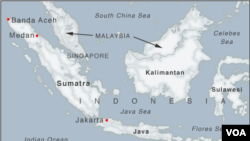Authorities in a North Sumatra village have banned three HIV+ orphans from elementary school, and threatened the children, who are from outside the area, with expulsion from Nainggolan due to community fears of transmission.
The children, a boy and two girls, aged 7 to 11 years, were infected by transmission from their mothers, Berlina Sibagariang, executive secretary of the Batak Protestant Christian Huria AIDS Committee (HKBP), told VOA Indonesia. The orphaned children attended preschool and the Nainggolan State Primary School in North Sumatra for one day before they were expelled, in response to outcry from students and parents who learned of their HIV status, according to Sibagariang.
“We want those three children to enjoy their rights to go to school and get an education,” Sibagariang said, adding “the community hopes that the children will no longer attend local schools. They are afraid that their children will be infected with HIV.”
The children were removed from classes on October 22, and Sibagariang said the local community set an October 25 deadline for the children to leave the village.
While an estimated five million people are infected with HIV in Asia, the rate of new infections has slowed in the last decade. But not in Indonesia, which now has an estimated 660,000 people living with HIV, according to the UNAIDS. According to the U.N. agency, Indonesia had 48,000 new HIV infections and 38,000 AIDS-related deaths in 2016, an increase in AIDS-related deaths of 68 percent from 2010. As of 2016, an estimated 3,200 Indonesian children were infected with HIV due to mother-to-child transmission.
There is, Indonesians activists note, ignorance of HIV and its transmission.
“Many people in our rural area still don’t really know what HIV/AIDS is, or the regulations covering it,” Puta Elvina, commissioner of Indonesia’s National Commission to Protect Children (KPAI) told VOA. In Nainggolan, “the school should educate the [Parent Teachers Association (PTA)] about HIV/AIDS so they know they don’t have to worry about it. [The PTA} should communicate to them how people become infected, how HIV is transmitted, etc. And the school has an obligation to those HIV-kids, to protect and support them. Actually not only the school, but also the local people (to support the kids) and the local government.”
Human immunodeficiency virus (HIV) can only be transmitted from an infected person to another through direct contact of bodily fluids such as blood (including menstrual blood), semen, vaginal secretions and breast milk, according to the San Francisco AIDS Foundation, a leading U.S. source of information on HIV and AIDS. “Blood contains the highest concentration of the virus, followed by semen, followed by vaginal fluids, followed by breast milk. … It is possible for an HIV-infected mother to transmit HIV before or during birth or through breast milk. Breast milk contains HIV, and while small amounts of breast milk do not pose significant threat of infection to adults, it is a risk for infants.”
The shunning behavior in Nainggolan is not unique. “HIV stigma is effectively universal, but its form varies from one country to another, and the specific groups targeted for AIDS stigma vary considerably,” says the University of California, Davis. “Whatever its form, HIV stigma inflicts suffering on people and interferes with attempts to fight the AIDS epidemic.”
Tiqoh, who has only one name, is an activist at Yayasan Pelita Ilmu (YPI), a non-governmental organization with a long track record on HIV/AIDS education in Indonesia, understands the difficulty of talking about HIV “with the local people, but perhaps the school could also involve doctors from the local clinic. Those parents and local people who refuse to take care these kids, or don’t want them to study in the same class as their children, they’re taking these actions because they don’t know much about HIV/AIDS. They’re just worry that their kids might be infected.”
HKBP is continuing talks with local government officials and the community as the Thursday deadline approaches in an attempt to stop expulsion of the children from Nainggolan.
“They said that we should remove those children because the local government hasn’t issued a permit to send children to those schools or even stay in that village,” said Sibagariang. “In fact, the home in that village – where we sent the children – is our home, an HKBP home. They have right to stay there. It’s our home!”
Local leader, Samosir Regent Rapidin Simbolon, told VOA that the HKBP hospital in Nainggolan once “accommodated the elderly, but now they accommodate children who are exposed to HIV.”
So far, the talks have resulted in a suggestion to homeschool the children but the HKBP AIDS Committee rejected this option, saying it would isolate the children and paper over what they see as the real issue: misunderstanding of HIV-AIDS.
The committee criticized another local leader, Samosir Deputy Regent, Juang Sinaga, who called for the children to be expelled from the village, and sent to the jungle.
Rapidin told VOA "I am responsible,” he said. “I will not allow the public to directly shun them. … We will protect (the children) so no one will take advantage of the situation. Be assured we are protecting them, we will even involve the police, if necessary. I guarantee that the children are being monitored.”
But the regent said that there were different opinions about the orphans–parents don’t want their children in classes with the HIV+ orphans, “while HKBP who said that [separating these children] is discriminating against HIV-people.”
“The HKBP does not want to understand us,” Rapidin said. “The three children who are positive are not from our region. They come from outside. We are actually very tolerant, it's OK here. But they (HKBP) are insistent. The HKBP cannot insist like that. Nainggolan residents also have rights."
Anugerah Andriansyah reported from North Sumatra, Indonesia and Eva Mazrieva reported from Washington, D.C.




